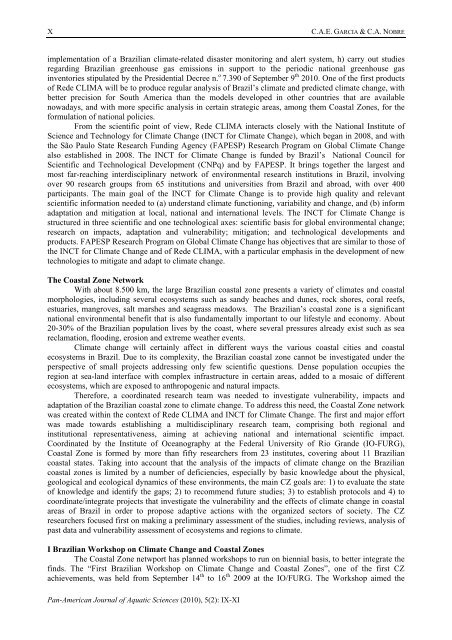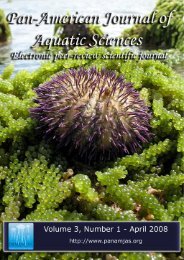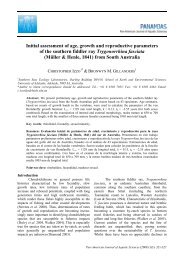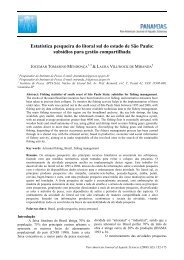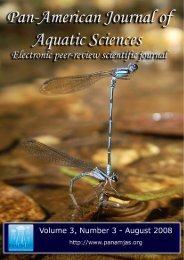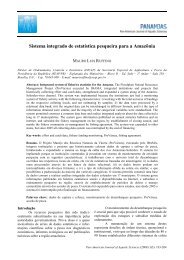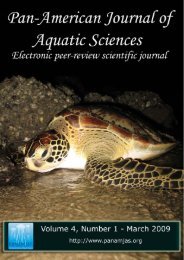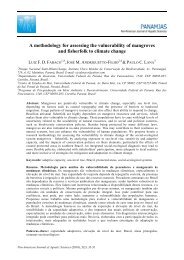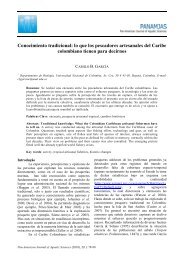F O R E W O R DCARLOS A. E. GARCIAScientific Coordinator of Coastal Zone NetworkUniversidade Federal do Rio Grande (FURG)Rio Grande, RS, BrazilCARLOS A. NOBREScientific Coordinator of Rede CLIMA and INCT for Climate ChangeInstituto Nacional de Pesquisas Espaciais (INPE)São José dos Campos, SP, BrasilThe Intergovernmental Panel on Climate Change (IPCC) projections for this century wouldcertainly result in a suite of biophysical and socio-economic impacts on the Brazilian coastal zone thatwould ultimately affect several sectors, including natural ecosystems, fisheries, transportation, tourism andrecreation, infrastructure and local communities.Global climate change will affect coastal zones where approximately 40% of world’s populationlives within 100 km of the coastline. The anticipated climate-related changes include an accelerated sealevel rise, a further increase in sea surface temperature, an intensification of tropical and extra-tropicalcyclones, large extreme waves and storms, alterations in the precipitation and run-off rates, oceanacidification, among others. These phenomena will vary from place to place at different time scales, buttheir impacts are most certainly to be negative on coastal societies.Coastal zones will face socio-economic and environmental problems, especially in low-lyingareas, which can be severely affected by seawater intrusion and local wave climate changes. For instance,the IPCC expects that, globally, mean sea level may rise as much as 88 cm by the end of the 21st century.One clear message that emerged from the last IPCC report is the urgent need to understand the impactsand assess the vulnerability of coastal zones to climate changes around the world.Although there has been a considerable increase in the understanding of the impacts of climatechanging on coastal zones and their ecosystems, there are still substantial knowledge gaps. Thevulnerability to climate change is highly variable, depending on the region and ecosystems underinvestigation. The capacity of adaptation of marine and coastal ecosystem will vary among species,communities, geographical regions and levels of system health and degradation. Rising in sea level andincrease in both frequency and intensity of storms would amplify the impacts on the detected areas underrisk. Coastlines under stress from human activities are particularly susceptible to global warming impactsand their vulnerabilities have to be urgently assessed. In highly urbanized areas floods rather than coastalerosion can cause strong impacts. Even worse, the historic drainage problem in certain coastal cities canbe magnified due to intense flooding causing a serious public health problem with groundwatercontamination, mosquito proliferation, and associated spread of diseases.The Brazilian Climate Change Research Programs: Rede CLIMA and INCT for Climate ChangeIn late 2007, the Brazilian Ministry of Science and Technology (MCT) created the BrazilianResearch Network on Climate Change (Rede CLIMA) with the following objectives: (a) generate anddisseminate knowledge and technology for Brazil to meet the challenges represented by the causes andeffects of global climate change; (b) gather data and information necessary to support Brazilian diplomacyin negotiations on the international regime for climate change; (c) develop studies on the impacts of globaland regional climate change in Brazil, with emphasis on the country's vulnerability to climate change; (d)consider alternatives for the adaptation of Brazil’s social, economic and natural systems; (e) investigatethe effects of changes in land use, and in Brazil’s social, economic and natural systems to the country’semissions that contribute to global climate change, and (f) contribute to the formulation and monitoring ofpublic policies on global climate change within the Brazilian territory, g) contribute to the conception andPan-American Journal of Aquatic Sciences (2010), 5(2): IX-XI
XC.A.E. GARCIA & C.A. NOBREimplementation of a Brazilian climate-related disaster monitoring and alert system, h) carry out studiesregarding Brazilian greenhouse gas emissions in support to the periodic national greenhouse gasinventories stipulated by the Presidential Decree n. o 7.390 of September 9 th 2010. One of the first productsof Rede CLIMA will be to produce regular analysis of Brazil’s climate and predicted climate change, withbetter precision for South America than the models developed in other countries that are availablenowadays, and with more specific analysis in certain strategic areas, among them Coastal Zones, for theformulation of national policies.From the scientific point of view, Rede CLIMA interacts closely with the National Institute ofScience and Technology for Climate Change (INCT for Climate Change), which began in 2008, and withthe São Paulo State Research Funding Agency (FAPESP) Research Program on Global Climate Changealso established in 2008. The INCT for Climate Change is funded by Brazil’s National Council forScientific and Technological Development (CNPq) and by FAPESP. It brings together the largest andmost far-reaching interdisciplinary network of environmental research institutions in Brazil, involvingover 90 research groups from 65 institutions and universities from Brazil and abroad, with over 400participants. The main goal of the INCT for Climate Change is to provide high quality and relevantscientific information needed to (a) understand climate functioning, variability and change, and (b) informadaptation and mitigation at local, national and international levels. The INCT for Climate Change isstructured in three scientific and one technological axes: scientific basis for global environmental change;research on impacts, adaptation and vulnerability; mitigation; and technological developments andproducts. FAPESP Research Program on Global Climate Change has objectives that are similar to those ofthe INCT for Climate Change and of Rede CLIMA, with a particular emphasis in the development of newtechnologies to mitigate and adapt to climate change.The Coastal Zone NetworkWith about 8.500 km, the large Brazilian coastal zone presents a variety of climates and coastalmorphologies, including several ecosystems such as sandy beaches and dunes, rock shores, coral reefs,estuaries, mangroves, salt marshes and seagrass meadows. The Brazilian’s coastal zone is a significantnational environmental benefit that is also fundamentally important to our lifestyle and economy. About20-30% of the Brazilian population lives by the coast, where several pressures already exist such as seareclamation, flooding, erosion and extreme weather events.Climate change will certainly affect in different ways the various coastal cities and coastalecosystems in Brazil. Due to its complexity, the Brazilian coastal zone cannot be investigated under theperspective of small projects addressing only few scientific questions. Dense population occupies theregion at sea-land interface with complex infrastructure in certain areas, added to a mosaic of differentecosystems, which are exposed to anthropogenic and natural impacts.Therefore, a coordinated research team was needed to investigate vulnerability, impacts andadaptation of the Brazilian coastal zone to climate change. To address this need, the Coastal Zone networkwas created within the context of Rede CLIMA and INCT for Climate Change. The first and major effortwas made towards establishing a multidisciplinary research team, comprising both regional andinstitutional representativeness, aiming at achieving national and international scientific impact.Coordinated by the Institute of Oceanography at the Federal University of Rio Grande (IO-FURG),Coastal Zone is formed by more than fifty researchers from 23 institutes, covering about 11 Braziliancoastal states. Taking into account that the analysis of the impacts of climate change on the Braziliancoastal zones is limited by a number of deficiencies, especially by basic knowledge about the physical,geological and ecological dynamics of these environments, the main CZ goals are: 1) to evaluate the stateof knowledge and identify the gaps; 2) to recommend future studies; 3) to establish protocols and 4) tocoordinate/integrate projects that investigate the vulnerability and the effects of climate change in coastalareas of Brazil in order to propose adaptive actions with the organized sectors of society. The CZresearchers focused first on making a preliminary assessment of the studies, including reviews, analysis ofpast data and vulnerability assessment of ecosystems and regions to climate.I Brazilian Workshop on Climate Change and Coastal ZonesThe Coastal Zone netwport has planned workshops to run on biennial basis, to better integrate thefinds. The “First Brazilian Workshop on Climate Change and Coastal Zones”, one of the first CZachievements, was held from September 14 th to 16 th 2009 at the IO/FURG. The Workshop aimed thePan-American Journal of Aquatic Sciences (2010), 5(2): IX-XI
- Page 3 and 4: PAN-AMERICAN JOURNAL OF AQUATIC SCI
- Page 5 and 6: Representations in the Brazilian me
- Page 7 and 8: IIM. S. COPERTINO ET ALLIIntroducti
- Page 9 and 10: IVM. S. COPERTINO ET ALLIpollution
- Page 11 and 12: VIM. S. COPERTINO ET ALLIpublic pol
- Page 13: VIIIM. S. COPERTINO ET ALLINicholls
- Page 17 and 18: Brazilian coastal vulnerability to
- Page 19 and 20: Brazilian coastal vulnerability to
- Page 21 and 22: Brazilian coastal vulnerability to
- Page 23 and 24: Brazilian coastal vulnerability to
- Page 25 and 26: Brazilian coastal vulnerability to
- Page 27 and 28: Brazilian coastal vulnerability to
- Page 29 and 30: Potential vulnerability of the Braz
- Page 31 and 32: Potential vulnerability of the Braz
- Page 33 and 34: Potential vulnerability of the Braz
- Page 36 and 37: 192J. L. NICOLODI & R. M. PETERMANN
- Page 38 and 39: 194J. L. NICOLODI & R. M. PETERMANN
- Page 40 and 41: 196J. L. NICOLODI & R. M. PETERMANN
- Page 42 and 43: 198J. L. NICOLODI & R. M. PETERMANN
- Page 44 and 45: 200J. L. NICOLODI & R. M. PETERMANN
- Page 46 and 47: 202J. L. NICOLODI & R. M. PETERMANN
- Page 48 and 49: 204J. L. NICOLODI & R. M. PETERMANN
- Page 50 and 51: 206L. F. D. FARACO ET ALLIIntroduct
- Page 52 and 53: 208L. F. D. FARACO ET ALLIclimate c
- Page 54 and 55: 210L. F. D. FARACO ET ALLIfocused o
- Page 56 and 57: 212L. F. D. FARACO ET ALLIIn spite
- Page 58 and 59: 214L. F. D. FARACO ET ALLIand ecolo
- Page 60 and 61: 216L. F. D. FARACO ET ALLIconsideri
- Page 62 and 63: 218L. F. D. FARACO ET ALLITable I.
- Page 64 and 65:
220L. F. D. FARACO ET ALLIBadjeck,
- Page 66 and 67:
222L. F. D. FARACO ET ALLIParaná,
- Page 68 and 69:
Status of Eastern Brazilian coral r
- Page 70 and 71:
226Z. M. A. N. LEAO ET ALLIVerrill
- Page 72 and 73:
228Z. M. A. N. LEAO ET ALLITable I.
- Page 74 and 75:
230Z. M. A. N. LEAO ET ALLICruz (20
- Page 76 and 77:
232Z. M. A. N. LEAO ET ALLIdistinct
- Page 78 and 79:
234Z. M. A. N. LEAO ET ALLIDutra, L
- Page 80 and 81:
Temporal and meridional variability
- Page 82 and 83:
238Á. M. CIOTTI ET ALLIdistributin
- Page 84 and 85:
240Á. M. CIOTTI ET ALLIFigure 2. B
- Page 86 and 87:
242Á. M. CIOTTI ET ALLIat the BSC
- Page 88 and 89:
244Á. M. CIOTTI ET ALLIcostal upwe
- Page 90 and 91:
246Á. M. CIOTTI ET ALLIfrom Area 7
- Page 92 and 93:
248Á. M. CIOTTI ET ALLITable III.
- Page 94 and 95:
250Á. M. CIOTTI ET ALLICampbell, J
- Page 96 and 97:
252Á. M. CIOTTI ET ALLIfloats. Dee
- Page 98 and 99:
Regime shifts, trends and interannu
- Page 100 and 101:
256FERNANDO E. HIRATA ET ALLIThe st
- Page 102 and 103:
258FERNANDO E. HIRATA ET ALLIcompar
- Page 104 and 105:
260FERNANDO E. HIRATA ET ALLIUsing
- Page 106 and 107:
262FERNANDO E. HIRATA ET ALLIFigure
- Page 108 and 109:
264FERNANDO E. HIRATA ET ALLIthis i
- Page 110 and 111:
266FERNANDO E. HIRATA ET ALLItal ch
- Page 112 and 113:
268D. MUEHE ET ALLIIntroductionThe
- Page 114 and 115:
270D. MUEHE ET ALLItrenches were du
- Page 116 and 117:
272D. MUEHE ET ALLIging the vegetat
- Page 118 and 119:
274D. MUEHE ET ALLIFigure 15. Estim
- Page 120 and 121:
276D. MUEHE ET ALLIPetrology, 27: 3
- Page 122 and 123:
278A. A. MACHADO ET ALLIdays, it is
- Page 124 and 125:
280A. A. MACHADO ET ALLIwas tested
- Page 126 and 127:
282A. A. MACHADO ET ALLIthe initial
- Page 128 and 129:
284A. A. MACHADO ET ALLIFigure 10.
- Page 130 and 131:
286A. A. MACHADO ET ALLIlevel. A ha
- Page 132 and 133:
288S. MEDEANIC & I. C. S. CORREAInt
- Page 134 and 135:
290S. MEDEANIC & I. C. S. CORREATab
- Page 136 and 137:
292S. MEDEANIC & I. C. S. CORREAFig
- Page 138 and 139:
294S. MEDEANIC & I. C. S. CORREA(in
- Page 140 and 141:
296S. MEDEANIC & I. C. S. CORREAJar
- Page 142 and 143:
Representations in the Brazilian me
- Page 144 and 145:
300D. HELLEBRANDT & L. HELLEBRANDTT
- Page 146 and 147:
302D. HELLEBRANDT & L. HELLEBRANDTF
- Page 148 and 149:
304D. HELLEBRANDT & L. HELLEBRANDTc
- Page 150 and 151:
306D. HELLEBRANDT & L. HELLEBRANDTT
- Page 152 and 153:
308D. HELLEBRANDT & L. HELLEBRANDTB
- Page 154 and 155:
Differences between spatial pattern
- Page 156 and 157:
312D.F.M GHERARDI ET ALLIface too m
- Page 158 and 159:
314D.F.M GHERARDI ET ALLIFigure 3.
- Page 160 and 161:
316D.F.M GHERARDI ET ALLIthe Brazil
- Page 162 and 163:
318D.F.M GHERARDI ET ALLIAcknowledg
- Page 164 and 165:
An essay on the potential effects o
- Page 166 and 167:
322F. A. SCHROEDER & J. P. CASTELLO
- Page 168 and 169:
324F. A. SCHROEDER & J. P. CASTELLO
- Page 170 and 171:
326F. A. SCHROEDER & J. P. CASTELLO
- Page 172 and 173:
328F. A. SCHROEDER & J. P. CASTELLO
- Page 174 and 175:
330F. A. SCHROEDER & J. P. CASTELLO
- Page 176 and 177:
332A. T. LEMOS & R. D. GHISOLFIIntr
- Page 178 and 179:
334A. T. LEMOS & R. D. GHISOLFIeros
- Page 180 and 181:
336A. T. LEMOS & R. D. GHISOLFITabl
- Page 182 and 183:
338A. T. LEMOS & R. D. GHISOLFIFigu
- Page 184 and 185:
340A. T. LEMOS & R. D. GHISOLFIOcea
- Page 186 and 187:
342M. B. S. F. COSTA ET ALLIcoastal
- Page 188 and 189:
344M. B. S. F. COSTA ET ALLIResults
- Page 190 and 191:
346M. B. S. F. COSTA ET ALLIlevel i
- Page 192 and 193:
348M. B. S. F. COSTA ET ALLIPaulist
- Page 194 and 195:
Temporal changes in the seaweed flo
- Page 196 and 197:
352CAROLINE DE FAVERI ET ALLITable
- Page 198 and 199:
354CAROLINE DE FAVERI ET ALLICallit
- Page 200 and 201:
356CAROLINE DE FAVERI ET ALLIcomple
- Page 202 and 203:
RIO GRANDE DECLARATION1 st BRAZILIA
- Page 204 and 205:
XIVResearchers from Rede Clima and


